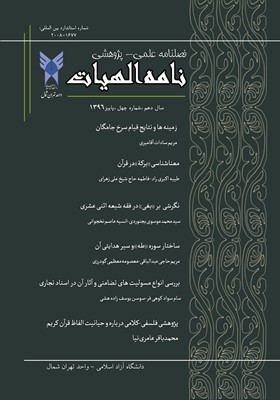Moving from meditation to meditation from the perspective of John the Cross
Subject Areas : Nameh ElahiyatAbd Al-Khaliq Jafari 1 , Bakhsh Ali Qanbari 2 * , Abd Al-Reza Mazaheri 3
1 - Student of Religions and Mysticism, Central Tehran Branch, Islamic Azad University, Tehran,, Iran
2 - Associate Professor, Department of Religions and Mysticism, Central Tehran Branch, Islamic Azad University, Tehran, Iran
3 - Professor, Department of Religions and Mysticism, Central Tehran Branch, Islamic Azad University, Tehran, Iran
Keywords: god, meditation, John,
Abstract :
Meditation and meditation are concepts that are often used interchangeably, but there are differences between them. There are many practices in Christianity that can be thought of as meditation or the practice of the presence of the mind. The meaning and concept of meditation is also found in the works of John the Cross, and it seems that he also believed in establishing a relationship with God in this way, provided that meditation leads to meditation. This relationship occurs early in the ascent for the soul and the active night experiences the senses. Communication through images, the senses, and the use of imagination, which John refers to as the imaginative method or sensory meditation and discourse meditation. Meditation is the work of two imagination and senses. The criterion for advancing towards union with God is to give up meditation and go to the stage of thinking. In the thinking phase, communication with God is not received through the senses, but indirectly through the spiritual part of the soul, where there may be more communication. John sees the transcendent experience as transcending thought and understanding into a state of calm and deep inner awakening, and compares this experience to awakening. He uses the term awakening to refer to the process of "awakening the soul from the natural to the supernatural" and believes that the soul, in its simplicity and purity, immediately becomes simple and pure wisdom. John calls meditation meditation: general and pure action, calm inner, loving knowledge, general knowledge or general romantic knowledge, contemplation, loving or peaceful presence, loving attention, attention and general romantic knowledge. In his opinion, contemplation is a sign of sweet divine love.
_||_

